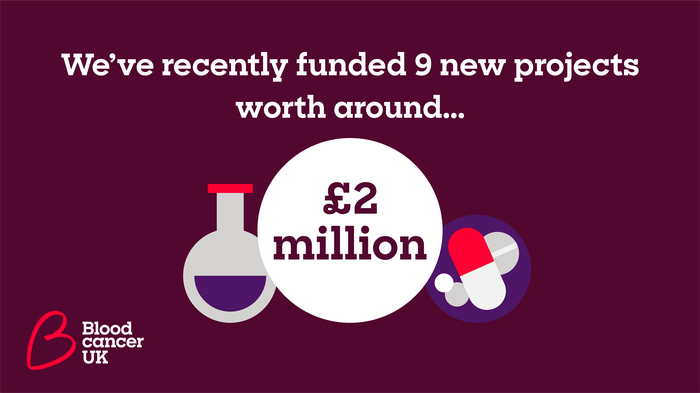Announcement: We're funding NINE research projects across multiple blood cancers
We're excited to announce funding for new blood cancer research projects taking place across the UK. Below we reveal a little about each project, and how they'll benefit people with blood cancer...

Since 1960 we've invested over £500million in research, helping transform blood cancer treatments. Research has taken us to the point where beating blood cancer is now in sight. Our researchers are working to finish the job, and we're proud to announce investment of a further £2million in nine research projects.
Seven brand new research projects:
🔎 Using the immune system to improve treatment for people with myeloma
In this project Dr Sarah Dimeloe and her team based at the University of Birmingham will look at how the immune system can be used to destroy cancer cells.
The team suspect that a protein in people with myeloma, called succinate, may be preventing T cells from destroying cancer cells and plan to investigate this further.
🔎 Reducing the need for chemotherapy in people with acute myeloid leukaemia
In this project Dr Richard Dillon at King's College London will look for markers in DNA that will tell clinicians if people with acute myeloid leukaemia (AML) are likely respond to a drug called venetoclax.
This project could help identify people with AML who could be treated with venetoclax and no longer require chemotherapy – sparing them from the associated side effects.
🔎 Improving treatment for people with lymphoma
In this project Professor Jude Fitzgibbon and his team based at Queen Mary University London want to understand how changes in the coating of our DNA can lead to lymphomas.
DNA is important but also fragile, so our cells protect it with a coating called chromatin. But if this coating changes or mutates, it can cause cells to become cancerous. This project wants to understand this further.
🔎 Understanding whether we can prevent acute myeloid leukaemia
Prof George Vassiliou, based at the University of Cambridge will try and find ways to prevent “pre-leukaemic” blood cells from progressing into full leukaemia.
If this work is successful, it could help create an entirely new approach to blood cancers – one that focuses on prevention before they become a serious problem.
🔎 Finding new ways to treat aggressive chronic myeloid leukaemia
Prof David Vetrie based at the University of Glasgow wants to understand why some cancers stop responding to treatment and others become more aggressive.
They also want to understand more about how and why chronic myeloid leukaemia can suddenly become very aggressive, to try and find ways to stop this from happening.
🔎 Reducing the risk of developing blood cancer in children with Schwachman-Diamond syndrome
Professor Alan Warren and his team at the University of Cambridge want to find new treatments for people with a congenital disorder that can cause cancers at a young age.
The team, who Blood Cancer UK have funded since 2003, will use new, detailed techniques to study protein construction in the hope that this will reveal more about how it goes wrong and how we might be able to develop new treatments.
🔎 Improving outcomes for people with MDS
Professor Stephen Jenkins, based at the University of Warwick, wants to test two new treatments in people with MDS.
If these drugs are shown to work, it could reduce the need for patients to get frequent blood transfusion which can impact their quality of life.
We've also committed to funding two ongoing research projects:
🔎 Developing more effective and safer treatments for childhood leukaemia
Prof Tariq Enver and his team at University College London are learning more about the biology of childhood ALL, and why it sometimes comes back after treatment.
This research will help us understand why not all children with ALL are cured by current therapies.
🔎 Improving the lives of children with leukaemia through tailored treatment
Professor Christine Harrison's project at Newcastle University collects and analyses genetic information from children with leukaemia to try and understand how to treat the disease.
Being able to understand and identify these changes helps doctors to diagnose more precisely and match people with the treatment most likely to be effective for them.
